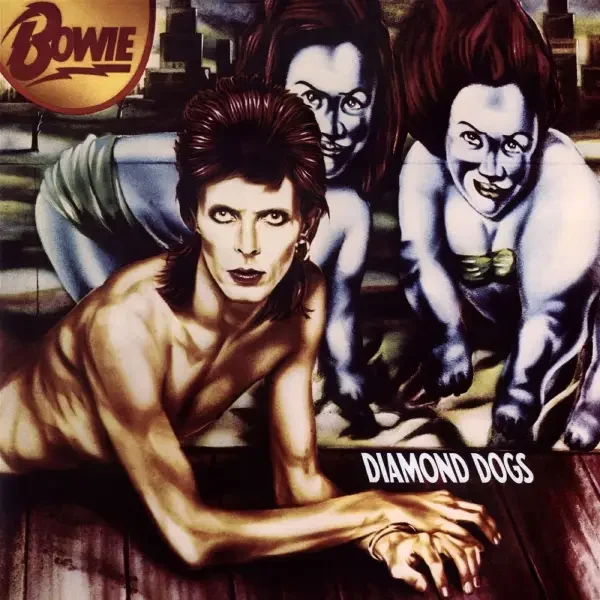David Bowie
– Diamond Dogs
By the time Diamond Dogs rolled around, Bowie was too restless to sit still. Ziggy was dead. Aladdin had wandered off in a cocaine haze. What remained was this dystopian glam Frankenstein stitched together with Orwellian paranoia, theater kid ambition, and rock ‘n’ roll sludge. Diamond Dogs doesn’t hold your hand. It lurches, creeps, and bursts. It’s glam’s haunted house, with Bowie playing the part of every ghost.

The record opens like a twisted carnival and never quite lets you off the ride. It’s part concept album, part farewell letter to an idea that never quite formed. Bowie wanted to adapt 1984 for Broadway but got blocked, so he did what he always did best—he built his own world out of scraps. There are no rules here. Just alley cats, freak shows, and ruins. And through it all, Bowie’s voice—sliding from croon to sneer, always one breath away from laughing at you.
Musically, it’s a rougher beast than what came before. The sheen of Ziggy Stardust gives way to cracked pavement and fuzzed-out guitars. Bowie plays lead on much of the album himself, and while he’s no Ronson, the mess adds to the menace. This is glam dragged through the gutter, sprayed in graffiti, and left twitching under the streetlight. It’s ragged. It’s overblown. It’s completely alive.
Choice Tracks
Diamond Dogs
This opener hits like a glam-rock apocalypse—chaotic, strutting, and filthy. Bowie howls about scavengers and swindlers with the glee of a man who’s decided to burn it all down and dance in the ashes. The riff isn’t tight, but it’s mean enough to leave marks. It’s part Stones swagger, part junkyard menace.
Sweet Thing / Candidate / Sweet Thing (Reprise)
This three-part suite is where the album starts hallucinating in technicolor. It’s theatrical, cracked, and desperate. Bowie sings like he’s seducing ghosts. The transitions are jagged, and the mood swings fast. It’s not seamless—but it’s gripping. Like watching someone put on a show for nobody but the voices in his head.
Rebel Rebel
One of Bowie’s most enduring rockers, and ironically the most straightforward thing here. That riff—the kind you can build an entire decade on—carries a sneer that hasn’t aged a day. Gender play, defiance, and eyeliner all rolled into one. He may have been drifting from glam, but he hadn’t forgotten how to light a fuse.
1984
Slick, funky, and almost too polished for the rest of the record. You can feel Bowie’s soul obsession creeping in. Wah-wah guitars and orchestral drama crash together, hinting at the Young Americans era just over the horizon. But here, it still has teeth.
Big Brother / Chant of the Ever Circling Skeletal Family
Here’s where the Orwell influence really takes over. “Big Brother” is eerie and hypnotic, with Bowie crooning like a cult leader on a public access channel. And then it spirals—literally. The closing chant loops like a scratched record from a surveillance nightmare. It’s unsettling, absurd, and unforgettable.
Diamond Dogs is not Bowie’s cleanest work. It’s a beautiful mess, dragged through a post-apocalyptic dream and left twitching under a disco ball. And that’s exactly why it still snarls decades later. It’s Bowie mid-transformation, halfway between characters, and utterly uninterested in staying in one place.

